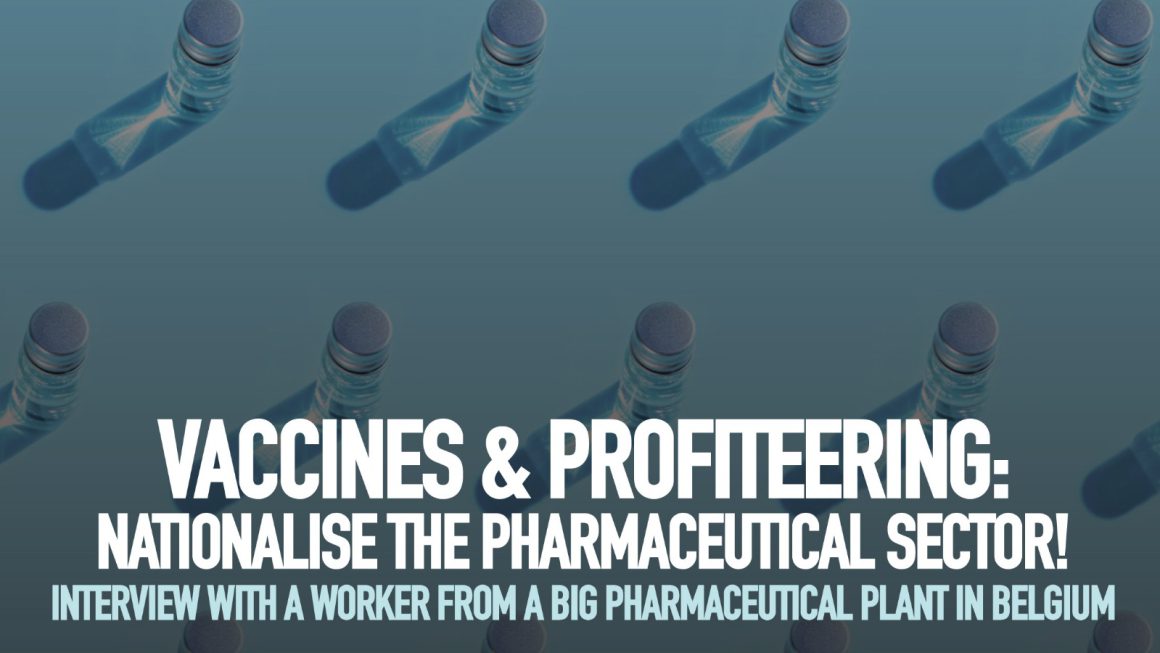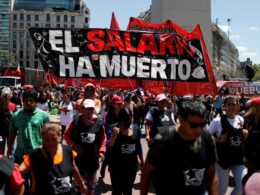Interview with a worker from a big pharmaceutical plant in Belgium. Why we need to nationalize the sector and how this can be done. First published in ‘Lutte Socialiste’ and ‘De Linkse Socialist’ — monthly papers of PSL/LSP (our sister organisation in Belgium)
Is there light at the end of the Corona Tunnel? Hopes that this is so are very high, especially now that the vaccination campaign has more or less started. Yet there is also distrust, partly because the pharmaceutical multinationals have shown in recent years their lack of real concern for our health. There is also distrust because governments failed to protect our health in the earlier phases of the pandemic, mainly because of their attachment to the market and the interests of private profit.
ISA believes the efficient vaccination of our health to protect against the virus of capitalist profit is needed. For this, the entire pharmaceutical sector should be nationalized in public hands.
PSL/LSP talked about this with a worker in one of the big pharmaceutical companies in Belgium.
What is your reaction to the development of the vaccine?
“These vaccines show formidable technological development. Imagine if all existing possibilities were developed collectively and systematically used to fight the numerous diseases and viruses that are currently untreatable. Unfortunately today, large companies only focus on profit, which means that this potential is not fully exploited or that the production of vaccines has sometimes to be carried out too quickly.
“By mid-January, there were 63 candidate vaccines being tested on humans, 19 of which were undergoing large-scale trials. In addition, there were 173 vaccine candidates still at the laboratory testing stage. The aim of the race to develop a vaccine is not so much to stop the disease as to be first on the market and win the jackpot. They are also using it to enhance their image with the wider public. When Pfizer announced its first vaccine results, the tests were still in progress. The aim was mainly to be first to get into the media.”
Some commentators say the competition between private companies leads to quick results. What do you think of that?
“The neoliberal argument that private competition is the engine of progress is not correct. The development of the corona vaccines has relied on a stream of public funds.
The neoliberal argument that private competition is the engine of progress is not correct. The development of the corona vaccines has relied on a stream of public funds.
The US Department of Health alone spent $10.6 billion on vaccine development. It is generally estimated that three out of four new drugs are developed through basic research funded by the community. The urgency of the corona vaccine prompted a number of companies to work together, recognising that collaboration can bring faster results. Worldwide cooperation instead of competition between them would undoubtedly have produced faster and better results with more research into, for example, all the possible side effects.
“The fact that each company refuses to share available knowledge is an obstacle to production. As a result, there will not be enough doses to vaccinate the entire world population in 2021. These shortages create inequalities, including between developed capitalist countries and those of the neo-colonial world. By November, even before vaccination could start, billions of doses had already been ordered, mainly by developed capitalist countries such as the US, European countries, Canada, Japan and Israel. These deals were mainly aimed at being the first to be supplied in order to strengthen the prestige of their own governments. After the struggle between different countries for access to mouth masks, we are now seeing the same thing with vaccines. There is even talk of ‘vaccine nationalism’. According to Oxfam and several NGOs, the poorest countries will not get their turn before 2024.
“The main goal of the companies in this sector is not the ensure the health of everyone, but the profits of their own shareholders. In 2014, the CEO of Bayer, Marijn Dekkers, was very open about this. He stated that a new cancer drug was ”intended for people who can afford it.“ He said this after a cheap variant of the drug Nexavar was marketed in India by a local manufacturer. Doctors Without Borders then remarked: ”Diseases from which they cannot make a profit they ignore, and patients who cannot pay are not taken into account.” Today, the same applies to the corona vaccine. The proposal by India and South Africa at the World Trade Organisation to suspend patents on corona vaccines in order to make cheap replicas was blocked by the European Union and others.
“The World Health Organisation has initiated an international cooperation project COVAX with the aim of vaccinating 20% of the world’s population and organising an equal distribution of vaccines. At the end of December, COVAX promised access to 1.3 billion doses for the world’s 92 poorest countries by 2021. However, most of the production of the two largest producers, Pfizer and Moderna, had already been bought up by developed capitalist countries. Moreover, COVAX cannot buy from those producers because these vaccines are too expensive… It shows how the anarchy of the market is an obstacle to a seriously planned worldwide vaccination campaign.
“The research and development should be done in a coordinated way, where knowledge is shared and global production based on the available knowledge is possible. This is necessary for our health, but it clashes with the private ownership of the means of production and the profit logic that goes with it.
“While there are enormous technological possibilities to fight diseases and viruses, capitalism is a brake on progress and worse, it leads to a decline in our health. For example, the lack of resources for care, including vaccinations, and austerity policies caused measles to surge again in Italy and Britain.”
At the end of December, the vaccination campaign started in Belgium. How do you see this as an employee in a large pharmaceutical company?
“The vaccination campaign is determined by the decisions made by the multinationals. Healthcare workers are already organising themselves as best they can, given the lack of resources. To this is now added the arbitrariness of the market. Pfizer, for example, decided in January that, in order to increase its production capacity, it would significantly reduce current production for up to several weeks. This follows production problems in December. For the medical staff, this makes it very difficult to organise the vaccination. They were hoping to be vaccinated as soon as possible, given the impact of the virus on both the health and morale of staff in a context of a sector suffering from shortages.
“The manufacturers say they will make little or no profit on the vaccine to support the community. So once the pandemic is over, the price may rise further. This is certainly problematic for the neo-colonial countries, where vaccination will only start later.
The prices paid in Europe have not been officially published. It was only after a blunder by the Belgian State Secretary De Bleeker from the liberal Open VLD party that the information was released. The two most expensive vaccines, those of Moderna (18 dollars) and Pfizer (12 euros), are already being distributed in Belgium. These are vaccines based on the new mRNA technology, where a piece of the gene is overwritten. This technique has existed for 12 years, but is now being used for the first time for a vaccine that is coming onto the market. The high price is being justified by the research into this technology, which is real. However, thanks to the corona crisis, pharmaceutical companies can immediately recoup these costs, making these investments profitable.
“In Belgium, the vaccination is ‘free’ to users. We know that this is obviously paid for by someone, including social security. The community pays, but it has no control over the production and distribution of the vaccines.
“The vaccination campaign could be done much faster with a coordinated approach, if all parts of the care and pharma sector were in public hands. In 1947, six million people were vaccinated against smallpox in New York in one month. Of course, you cannot compare a local smallpox vaccination with a global pandemic such as Covid-19. But surely a planned application of technological know-how, production and logistics should make it possible to be at least as efficient as New York was more than 70 years ago?”
Many people question vaccinations, not necessarily because they believe in conspiracy theories, but simply on the basis of mistrust. Do you understand that?
“Definitely. The anti-vaxxer movement is actually quite small in Belgium. But it is not the anti-vaxxers themselves that are creating distrust. Many people don’t distrust the vaccine itself, but the role of multinationals and governments. The credibility of capitalist institutions and large companies is justifiably low!
“The many examples of companies that have not hesitated to increase their profits at the expense of our health have undermined their credibility. Think of Dieselgate where the emissions from cars were falsified in Europe. Or the Japanese energy company that did not invest enough in the safety of the Fukushima nuclear power plant. Chemical company Monsanto knew for years that its product Round-Up was carcinogenic, but did nothing about it. Oil companies have known for a long time that fossil fuels are detrimental to global warming, but invest in lobbying campaigns and pseudoscience to deny climate change. Big companies lie and cheat when it suits their profits.
“It is best to respond to this with an approach that focuses on the interests of the majority of the population. We say the pharmaceutical sector should be placed in public hands to enable democratic control by workers and the community.
This is certainly important in Belgium because the pharmaceutical sector is so big here. For example, GSK in Wavre is the largest vaccine production centre in the world. Two million doses of all kinds of vaccines are made there every day. It is the largest private biochemical analysis centre in the world. Pfizer will carry out its entire European production of corona vaccines in Puurs. Pfizer, Janssens Pharmaceutica (part of Johnson & Johnson), UCB and GSK together account for almost half of the 50.000 pharma jobs (in terms of full-time equivalents) in our country. Including the indirect jobs, 120.000 people depend on this sector. Imagine if all these resources were dedicated to a coordinated and community-controlled response to the pandemic!”
How can we force the sector into public hands?
“The ‘Care in Action’ demonstration of health workers in Brussels on 13 September had the right approach. The slogan ’They count their profits, we count our dead’ is a criticism of the government but also of the whole system. The big pharmaceutical companies make huge profits, also thanks to the pandemic. At the same time, hospitals and the rest of the health sector are groaning under the shortages. By organising struggle, we can turn the broad solidarity among the population into action. We cannot leave that to the establishment.
“There is also the European citizens’ initiative ‘No profit from the pandemic’, supported by the PTB/PVDA in our country, among others, which is collecting signatures on four demands: health for all by abolishing patents, transparency over production costs and efficiency, among other things, public control of vaccines and treatments for which the research was financed with public money, no profit on the pandemic so that the products are affordable and available. These demands will not be achieved overnight; they will require an active campaign and a strong intervention by the workers movement. After all, even very logical proposals immediately clash with the market forces of capitalism.
“We must not confine ourselves to demanding that no profits be made on the corona vaccine. The entire sector must be under public control. According to the European citizens’ initiative, manufacturers will produce more mass doses if there is no patent. However, it is somewhat naive to think that multinationals will be motivated to produce a vaccine if there is no profit. It is true that vaccines are sometimes sold at cost price in neo-colonial countries, but this is more of a diplomatic gesture to improve image and gain access to a market where profits are recouped through other vaccines. We see this with GSK, which is working with NGOs and the WHO in a programme to eradicate tropical diseases.
“Patents are an obstacle to our health, but they are a cornerstone of the capitalist profit system. Abolishing them without nationalising the sector would mean that investments would be recouped elsewhere: through increasing the prices of other medicines or on the backs of personnel. It is therefore best to link this immediately to the need to bring the sector into public hands.”
What would be the benefits of a nationalised pharmaceutical sector?
“Often, the demand for nationalisation is limited to companies that are downsizing or in danger of closing down. However, it is a demand that is important not only for employment, but also to gain control of the workers and their families over what is produced and how. For this it is essential that the banking sector and key industries are taken over.
“The pharmaceutical sector in Belgium accounts for an added value of 14.7 billion euros per year, this is before wages are paid. Even after wages are deducted, they are still left with about 10 billion euros. This is money taken from the pockets of those who are sick and given to the large shareholders.
Social security reimburses 7 billion euro per year for medicines and, in addition, 5 billion euro’s worth per year are sold without reimbursement. Now the most profitable part of the whole healthcare chain is in private hands, while a large part of the costs are met by the community. This is not logical and, moreover, the profit logic creates shortages. Up to half of the children in poverty do not have access to medicines because they are too expensive. There are permanent shortages of about 500 medicines because the sector focuses on profits and not on medical needs. By nationalising the sector, the community can democratically decide what to produce based on the needs and not the profits.
“Today, the profit logic means that advances in technology can lead to job losses in the sector. Messenger RNA, the technique used by Pfizer and Moderna for the corona vaccine, offers enormous potential. This means that more can be produced in a shorter time with fewer staff. Technological progress thus threatens to become synonymous with social decline. That too is a contradiction of capitalism.
“Research, production, distribution and logistics must all be under the management and control of the workers in the sector and the community, so that health comes first. That means cheap and accessible drugs, decent working conditions for staff in both the pharmaceutical sector and the rest of the health service, coordination of everything to do with health in a national health service that can put more emphasis on preventive medicine. It would also make large-scale interventions such as mass vaccination campaigns easier.
“Finally, a pharmaceutical sector in public hands would also put an end to the fact that today more is invested in marketing than in research. Not that marketing should disappear: prevention campaigns could be set up around vaccinations, healthy living, but also, for example, in the fight against violence against women and other issues.
“In short, there are many arguments for taking the sector into public hands. To achieve this, struggle will be needed. From the beginning of the pandemic, the working class has made demands for safety at work, protective equipment and resources for care. The awareness that it is the workers who make everything work has increased. This will play an important role in future struggles. We can win by turning the power of our numbers into organisation. Mass involvement is essential and can lay the foundation for the majority of the population to finally take the fate of humanity and the planet into their own hands. Capitalism is disastrous for workers and the climate. This system will bring us more pandemics and is a brake on responding to them. A socialist alternative is necessary: a society that starts from the needs and requirements of the workers and their families.”












